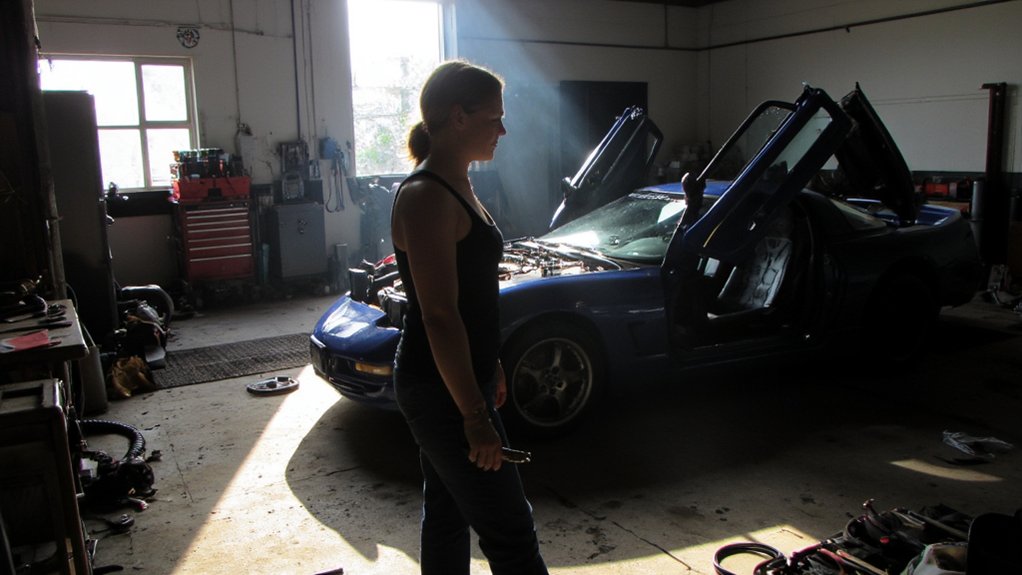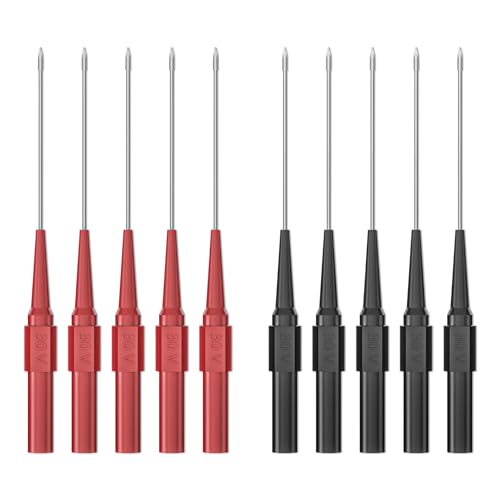
Car Wiring Harness Repair Costs: Top 10 Factors

When evaluating car wiring harness repair costs, you need to take into account vehicle age and condition, wiring system complexity, and damage extent, as they directly impact required parts and labor.
Labor rates vary regionally and depend on system intricacy, while parts availability and quality influence expenses.
Diagnostic testing guarantees accurate fault identification, and any electrical upgrades can increase complexity and cost.
Preventive maintenance helps avoid costly failures. Understanding these factors gives you a clearer picture of potential expenses and repair scope ahead.
Table
- Main Points
- Vehicle Age and Condition Impact
- Complexity of Wiring System
- Extent of Wiring Damage
- Labor Costs and Regional Variations
- Parts Availability and Replacement Needs
- Accessibility of the Wiring Harness
- Diagnostic and Testing Requirements
- Quality of Repair Materials Used
- Electrical System Modifications and Upgrades
- Preventive Maintenance and Early Detection
- Frequently Asked Questions
- Final Thoughts
Main Points
- Vehicle age and condition significantly affect wiring harness repair costs due to insulation degradation and connector corrosion over time.
- Complexity of the vehicle’s electrical system and added features increase diagnostic time and labor costs for wiring repairs.
- Extent of wiring damage determines if simple splicing or full harness replacement is needed, impacting total repair expenses.
- Labor rates vary by region and vehicle type, typically ranging from $50 to $150 per hour, influencing overall repair costs.
- Choosing OEM parts versus aftermarket components affects cost, quality, and long-term reliability of wiring harness repairs.
Vehicle Age and Condition Impact
Although newer vehicles feature advanced electrical systems, you’ll often face higher repair costs for wiring harness issues as your car ages due to component wear and limited parts availability. Vehicle age directly affects wiring harness integrity; insulation degrades and connectors corrode over time, increasing the likelihood of electrical issues. If your vehicle has endured harsh environments like moisture or extreme temperatures, wiring damage accelerates, driving repair costs upward. Additionally, sourcing replacement wiring harnesses for older models can be challenging and expensive, as parts become scarce. However, maintaining your vehicle diligently can mitigate some risks, preserving wiring condition and reducing electrical failures. Understanding these factors empowers you to anticipate potential expenses and make informed decisions about repairs or upgrades, ultimately freeing you from unexpected costs linked to wiring harness deterioration.
Complexity of Wiring System

When dealing with wiring harness repairs, the complexity of your vehicle’s electrical system directly influences the cost and time required. A simple wiring system with basic electrical components usually means straightforward repairs, keeping the repair cost between $100 and $500. However, as the complexity of wiring system increases—especially with advanced safety and infotainment features—diagnosing issues demands more labor hours, sometimes 10 to 20, pushing costs beyond $3,000. Labor rates, ranging from $50 to $150 per hour depending on your location, also affect this expense. You’ll find that intricate wiring requires careful analysis and precise handling to restore full functionality, making it essential to understand that higher complexity means more time diagnosing issues and repairing, which directly impacts your total repair cost.
Extent of Wiring Damage

Since wiring damage varies widely, understanding its extent is essential for estimating repair costs accurately. Minor issues like splicing or connector replacements typically cost between $100 and $500. However, when the damage is extensive, you might face a full harness replacement, which can range from $500 to over $3,000 depending on your vehicle’s make and model. Diagnosing the extent of wiring damage often requires tools like an OBD-II scanner to pinpoint specific faults. Regular inspections empower you to detect early wear or fraying, potentially avoiding costly repairs. By evaluating damage precisely, you maintain control over repair costs and prevent unexpected expenses tied to thorough harness overhauls. Prioritize regular inspections to extend your wiring system’s longevity and minimize disruptions to your vehicle’s performance.
Labor Costs and Regional Variations

Understanding the extent of wiring damage helps you anticipate parts costs, but labor expenses play an equally important role in your total repair bill. Labor costs for wiring harness repairs vary widely, influenced primarily by geographic location and the vehicle's make and model. Hourly rates range from $50 to $150, with urban areas like California charging up to $174 due to higher operational expenses. In contrast, states such as Mississippi may offer rates near $110. The complexity of your vehicle’s electrical system affects the labor time required, often between 10 to 20 hours. This means labor costs can greatly fluctuate based on where you live and your car’s specifications, making it essential to factor in these regional and technical variables when budgeting for wiring harness repairs.
Parts Availability and Replacement Needs

When choosing parts for your wiring harness repair, you’ll need to weigh genuine OEM components against aftermarket alternatives. OEM parts guarantee compatibility and quality but come at a higher cost, while aftermarket options may reduce expenses but risk fitment issues. Ensuring component compatibility is critical to avoid electrical failures or additional repairs down the line.
 How to Upgrade Car Lighting for Safer Driving
How to Upgrade Car Lighting for Safer DrivingGenuine Vs Aftermarket
Although genuine wiring harnesses often come at a higher cost and may be harder to find for older or discontinued vehicles, they guarantee compatibility and quality that aftermarket parts might not consistently provide. When weighing genuine parts against aftermarket options, consider:
- Cost vs. Longevity: Genuine wiring harnesses usually cost between $500 and $3,000+, but their durability often reduces future repair costs.
- Availability: Aftermarket options offer broader availability, especially if genuine parts are scarce or discontinued.
- Quality Assurance: Genuine parts meet strict manufacturer standards, while aftermarket quality varies, requiring careful supplier vetting.
Choosing genuine wiring harnesses guarantees precise fit and reliable performance, but aftermarket alternatives can free you from limited availability and budget constraints—just research thoroughly to avoid potential pitfalls.
Component Compatibility Concerns
Since wiring harnesses serve as the vehicle's electrical backbone, guaranteeing component compatibility is critical to avoid malfunctions or electrical failures. When you undertake wiring repair, you must use parts designed specifically for your vehicle’s make, model, and year to maintain seamless integration with its electrical systems. OEM parts guarantee this compatibility and reliability, though they often come at a higher price than aftermarket alternatives. Keep in mind, replacing a wiring harness may require swapping connectors and related components to guarantee proper fit and function. Limited availability of exact harnesses can extend repair timelines, and additional modifications to integrate new parts can increase labor costs. Prioritizing precise component compatibility safeguards your vehicle’s electrical integrity and prevents future costly issues.
Accessibility of the Wiring Harness
Because accessing the wiring harness often requires maneuvering through tight spaces or removing additional components, you can expect labor time—and costs—to rise considerably. Accessibility directly influences repair costs due to the wiring harness’s complexity and location. To anticipate expenses, consider these factors:
Access challenges increase wiring harness repair time and costs due to complexity and location.
- Location Difficulty: Compact engine bays or integrated harnesses require extra disassembly, increasing labor hours.
- Harness Complexity: More connectors and junctions complicate repairs, demanding specialized tools and expertise.
- Component Removal: When the harness is embedded within other parts, removing these adds to both time and cost.
These accessibility challenges can push minor repairs from $100 up to $500, while full replacements may exceed $3,000. Understanding these variables helps you navigate repair costs effectively and regain control over your vehicle’s electrical system.
Diagnostic and Testing Requirements
Understanding the accessibility challenges of your wiring harness sets the stage for accurate diagnostics and testing. When diagnosing engine wiring issues, you begin with visual inspections to spot frayed wires or corroded connectors. Next, use an OBD-II scanner to retrieve trouble codes pinpointing specific faults within the harness. Continuity tests with a multimeter verify wiring integrity, revealing internal breaks not visible externally. Additionally, checking voltage at key points guarantees proper electrical flow throughout the system. For complex problems, advanced diagnostic tools and techniques become essential to isolate issues affecting vehicle performance. By applying these precise diagnostics and testing methods, you gain control over identifying and addressing wiring issues efficiently, freeing yourself from guesswork and unnecessary repairs.
Quality of Repair Materials Used
Material quality plays a vital role in the durability and reliability of wiring harness repairs. When you prioritize the quality of repair materials, you enhance the longevity of your vehicle’s electrical system, reducing future failures. Consider these key factors:
- Use OEM parts: These components match your vehicle’s exact specifications, ensuring ideal performance and compatibility.
- Select premium insulation: High-grade insulation shields wires from heat, moisture, and abrasion, preventing premature wear.
- Apply dielectric grease: This prevents corrosion at connectors, maintaining stable electrical connections essential for system integrity.
Electrical System Modifications and Upgrades
When upgrading your car’s electrical system, you need to verify all new components are compatible with the existing wiring to avoid costly failures. The complexity of the wiring harness often increases with each modification, directly impacting repair and labor costs. Hiring a professional for installation is essential to maintain system integrity and prevent damage.
Upgrade Compatibility Considerations
Although upgrading your vehicle’s electrical system can enhance performance and functionality, you’ll need compatible wiring harnesses to guarantee all components operate reliably. Ignoring upgrade compatibility considerations risks electrical malfunctions and costly repairs. When planning your upgrade, focus on these key points:
 What Causes Issues in Your Car Fuse Box?
What Causes Issues in Your Car Fuse Box?- Assess the wiring harness’s load capacity to handle increased power without overheating or failure.
- Verify aftermarket accessories and performance parts integrate seamlessly with your existing wiring harness to avoid additional modifications.
- Confirm compatibility of high-performance components like alternators and battery systems to prevent system conflicts.
Professional installation is essential—improper wiring can lead to safety hazards and inflate repair costs. Prioritize precise compatibility checks to liberate your vehicle’s full potential while safeguarding its electrical integrity.
Wiring Complexity Impact
Upgrading your vehicle's electrical system often means adding new wiring or components, which increases the overall intricacy of the wiring harness. This added intricacy directly impacts repair costs, as intricate wiring requires more labor and specialized knowledge to diagnose and fix. Each vehicle model has unique wiring configurations, so modifications may need tailored solutions, driving up the time and expense involved. Installing aftermarket parts without proper integration can overload the electrical system, forcing a thorough wiring harness upgrade to maintain reliability. Neglecting regular inspections after upgrades raises the risk of hidden wiring faults, leading to costly repairs. To manage wiring repair costs effectively, you must understand how modifications affect your vehicle’s electrical system intricacy and plan maintenance accordingly, ensuring longevity and minimizing unexpected expenses.
Professional Installation Necessity
Because electrical system modifications involve intricate wiring and sensitive components, you should rely on professional installation to affirm safety and reliability. The complexity of modern vehicles demands specialized knowledge and tools, making DIY attempts risky. Experienced technicians affirm repairs align with manufacturer specifications, preventing future electrical failures.
When considering professional installation for repairing your cars, keep these factors in mind:
- Accurate diagnosis and precise wiring execution by certified experts.
- Preservation of warranty coverage by adhering to manufacturer requirements.
- Avoidance of costly mistakes stemming from improper handling of complex systems.
Investing in professional installation not only protects your vehicle’s electrical integrity but also liberates you from potential hazards and unforeseen expenses.
Preventive Maintenance and Early Detection
When you perform regular inspections on your car’s wiring harness, you can quickly spot signs of wear, fraying, or exposure to harsh conditions that might cause serious damage if left unchecked. Preventive maintenance is essential to prevent car electrical failures and costly repairs. By monitoring the electrical system during routine checks, you enable early detection of faults before they escalate. Secure harnesses with clips or zip ties to minimize friction and stretching, and apply dielectric grease to connectors to protect against moisture and corrosion. Additionally, avoid overloading circuits by using separate harnesses for added components. This practical approach not only extends the lifespan of your wiring harness but also liberates you from unexpected breakdowns, ensuring reliable vehicle performance and controlled repair costs. Drawing from best practices for structural integrity in home repairs, maintaining a clean, safe environment around your car’s wiring can also help prevent accidental damage during inspections and repairs.
Frequently Asked Questions
Why Is a Wiring Harness so Expensive?
You’ll find wiring harnesses pricey because manufacturing complexity demands specialized wiring harness materials tailored to your vehicle type. Plus, labor costs spike due to intensive installation and diagnostic work, making repairs or replacements costly but essential.
How Much to Replace a Wiring Harness?
Replacing wiring harness types varies; installation costs depend on complexity and common issues. You can lower expenses through DIY repairs if skilled, but professional help guarantees safety and precision, especially with intricate harnesses and advanced vehicle systems.
How to Diagnose a Bad Wiring Harness?
You’ll diagnose a bad wiring harness by identifying wiring symptoms like misfires, using harness testing with a multimeter and OBD-II scanner to detect electrical issues, then applying precise repair techniques to restore proper function and guarantee reliability.
How Long Does a Car Wiring Harness Last?
Think of your wiring harness like a marathon runner; with proper maintenance tips, it thrives 10-15 years. Wiring lifespan factors include heat and moisture. Watch for replacement signs like shorts or corrosion to avoid common issues.
 7 Best Signs Your Car Alternator Is Failing
7 Best Signs Your Car Alternator Is FailingFinal Thoughts
When repairing your car’s wiring harness, you’ll want to take into account all key factors—from vehicle age and wiring complexity to labor costs and parts availability. Remember, cutting corners now may cost you an arm and a leg later. Prioritize quality materials, thorough diagnostics, and timely maintenance to guarantee long-term reliability. Taking a detailed, proactive approach helps you avoid unexpected expenses and keeps your vehicle’s electrical system running smoothly and safely.
Reliable Floor Jacks on a Budget: Best Picks for Under $150
Top-Rated Floor Jacks Over $100: Built for Professionals, Priced for Smart Buyers
If you want to know other articles similar to Car Wiring Harness Repair Costs: Top 10 Factors you can visit the Lighting Electrical Care category.
Leave a Reply






















































This is also interesting